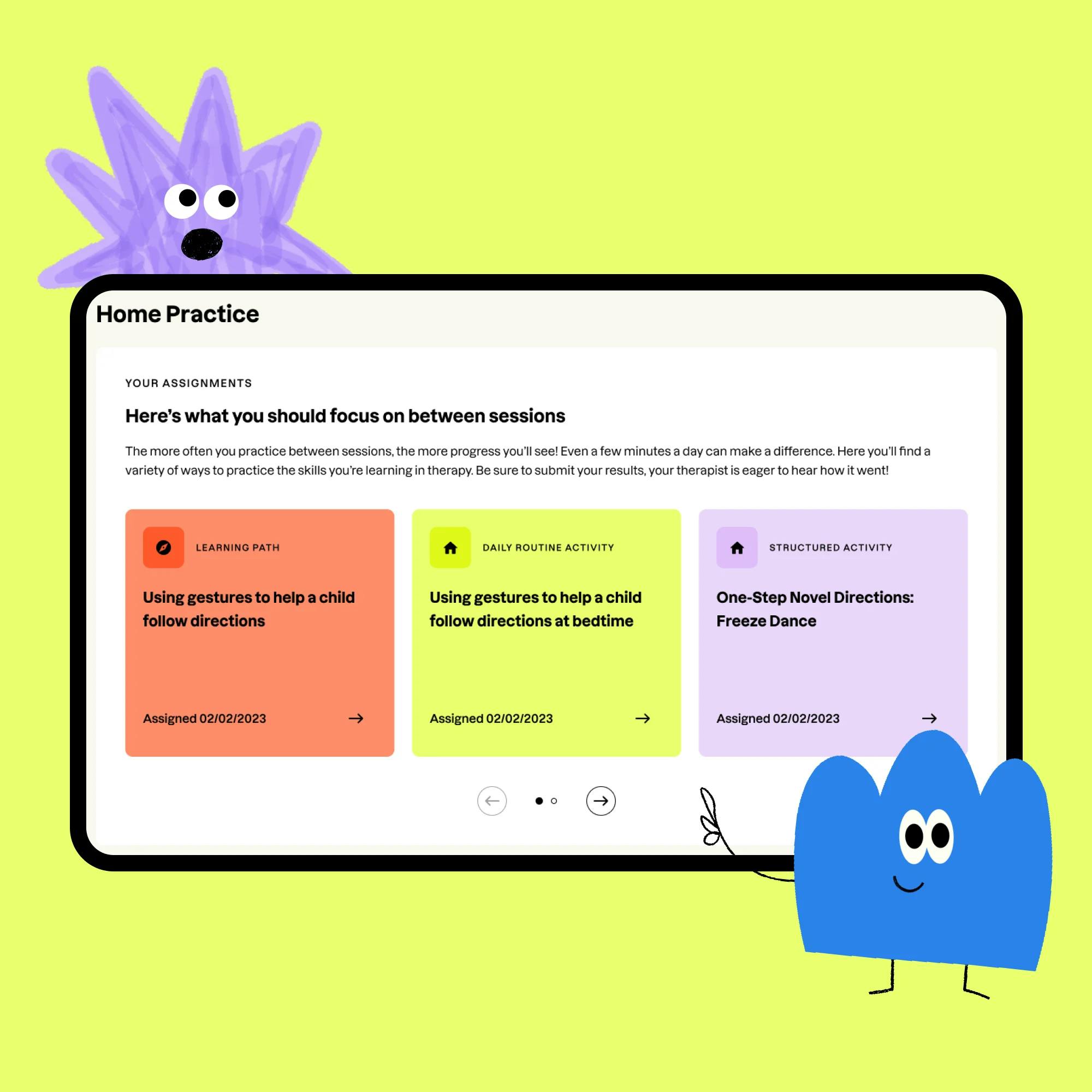
The Importance of Parent Involvement in Speech Therapy
 Leanne Sherred, M.S., CCC-SLP
Leanne Sherred, M.S., CCC-SLP
One of the most powerful tools your child has to improve their speech and language isn't flashcards, an app, or even a speech therapist. It's you--their parent or caregiver.
As speech therapists, we can't overstate the importance of caregiver involvement in a child’s speech therapy. We see it over and over again in the thousands of families we serve. And research has proved it: When parents and caregivers attend therapy sessions and play an active role, kids make much more progress toward their speech and language goals.
Let's take a look at how and why you should get involved in your child's speech therapy.
The power of parents in speech therapy progress
When a child is diagnosed with a speech or language problem, families enter a new and unfamiliar world. From evaluations to treatment plans to therapy exercises, it can feel overwhelming. It may be tempting to rely on your speech therapist to “fix” the problem.
But while your speech therapist will use strategies and techniques to improve your child’s communication, there’s no substitute for the unique opportunity you have to practice with your child at home. Speech therapists are experts in clinical diagnosis and treatment. You are the expert on your child! And you're the one who spends the most time with them.
Speech therapists are experts in diagnosis and treatment. You are the expert on your child!
After all, think about it: Your child sees their therapist a few times a week, but they're with you every day. Speech and language skills need to be practiced regularly in order to learn and grow.
At the end of the day, it’s really no different than learning to play an instrument like a guitar. Weekly lessons will definitely help you learn scales, strumming techniques, and power chords. But if you don’t practice at home, it’ll take you a lot longer to master a grand rendition of "Stairway to Heaven."


How can you help your child with their speech at home?
While your speech therapist teaches your child during sessions, they should be teaching you, too! This approach is called parent coaching, and it's the cornerstone of how we provide speech therapy at Expressable.
In parent coaching, you attend sessions alongside your child. You learn from the speech therapist how to help your child with their speech at home, practicing the techniques they're learning in therapy.
You can actually play and interact with your child during the session, following the speech therapist's guidance. Your therapist will give you recommendations and tips in real time! And you'll be set up to keep the practice going all week long--enabling your child to make faster progress (and maybe even graduate from speech therapy sooner!).


Why does parent involvement work so well in speech therapy?
As mentioned above, research has shown that caregivers can make a big difference in their child's speech therapy. There are several reasons for this:
You know your child best
Your speech therapist will strive to get to know your child: their personality, their learning style, and how they handle problems. However, a speech therapist can never replace your connection with your child. You know their interests and personality best. By working closely with your speech therapist, you can help develop a treatment approach perfectly tailored to your child.
Inside the session: Watch a toddler having fun with online speech therapy!
Watch hereLearning happens all day, every day
Your speech therapist only sees your child a few times a week. Whether a child is learning to use more words, pronounce a speech sound, or understand simple sentences, these new skills should be practiced and reinforced every day.
Caregivers have the advantage of spending much more time with their children. And considering that kids learn to communicate during everyday activities and conversations, no one is better positioned to do that than you.
Speech therapy doesn’t require a desk and a chair or special materials. You can use bathtime, playtime, mealtime, and even trips to the store to work on your child’s speech and language. During therapy sessions, your child learns new knowledge and skills. But when they interact with you at home, during daily routines, they have a chance to put that new knowledge into practice.


Learning is more effective in a comforting environment
Many people get uncomfortable when walking into a medical office or therapy clinic. Working with you at home, in an environment that’s natural and familiar, is a stress-free way for kids to practice the new skills they’ve learned at therapy.
It’s also a reason more and more families are choosing online speech therapy instead of in-person services. Instead of an office or classroom, your child learns and practices at home, where they're comfortable and their own toys and games can be incorporated into sessions.

What does the research say about parent involvement in speech therapy?
A study conducted by researchers from Vanderbilt University looked at how well “parent-implemented intervention” worked among groups of parents trained to promote their child’s communication. Here were some key results from the study:
Parents were able to understand and learn the strategies taught by the speech therapists, and use them when interacting with their child.
Children showed improvement in their verbal and nonverbal communication skills, including understanding, vocabulary, grammar, and how often they communicated.
Parents were just as effective at helping their child as speech therapists were. In fact, when it came to understanding language and grammar, parents were actually more effective than the therapists.
Children with a variety of language difficulties, including language impairment, autism, and developmental delay, also made major progress when their parents were involved.
Other studies have backed up these results. For example, this paper analyzed 18 other studies on parent involvement. The results showed that parent-implemented interventions had a significant, positive impact on the language skills of children with and without intellectual disabilities. A 2021 study looked at the effect of parent involvement on late-talking toddlers. Parents learned how to help their children talk more while reading together, leading to improvement in the children's expressive language abilities.


Find the right speech therapist for your family
Parental involvement enables kids to make faster progress and reach their goals sooner. Get matched with an Expressable speech therapist who will teach you along with your child! You can schedule sessions at a time that works for your family, and learn together from the comfort of home.
How Expressable Can Help
Concerned your child isn't reaching age-expected milestones? Looking for communication support from a professional? Expressable is a national online speech therapy practice serving children and adults. We treat all major areas of communication and feeding, offer flexible hours including evenings and weekends, and accept most major health insurance plans. We’re proud to have earned more than 3,000 5-star reviews from our clients (4.9/5 average).
Our therapy model is centered on parent and caregiver involvement. Research proves that empowering caregivers to participate in their loved one’s therapy leads to better outcomes. That’s why we combine live, 1-on-1 speech therapy with personalized education and home practice activities for faster progress.
Communication is more than words. It’s how we share how we feel and show who we are. We’re here to help you or your child do just that.












